In the Bihać city cemetery is a row of freshly dug graves. Under the green wooden grave markers lie the bodies of unidentified people who died in this part of Bosnia and Herzegovina near the Croatian border. The grave markers bear only the most minimal identifiers — N.N.1, N.N.2, N.N.3…
Nomen Nescio in Latin denotes an unnamed person: This is how the dream of a better life, and the trials of a difficult journey toward the EU have come to an end in the Bihać cemetery.
And not only in Bihać — wherever people on the move die, it seems they are buried in forgotten plots of small cemeteries, and their graves are often left without a name. When searches are organized by families, volunteers or religious officials, all too often this is where the trail runs out.
Each year, thousands of people go missing in an attempt to reach Europe. There is no reliable statistical data on missing persons but according to International Organization for Migration (IOM) data on the Missing Migrants page, 1,861 migrants have so far perished throughout the world in 2020.
In 2017, Bosnia started recording more arrivals. According to Bosnian Service for Foreigners’ Affairs data, from 2018 until the start of September this year, almost 60,000 displaced people have entered the country. Of that number, half arrived last year, but numbers have dwindled since the beginning of the coronavirus pandemic.
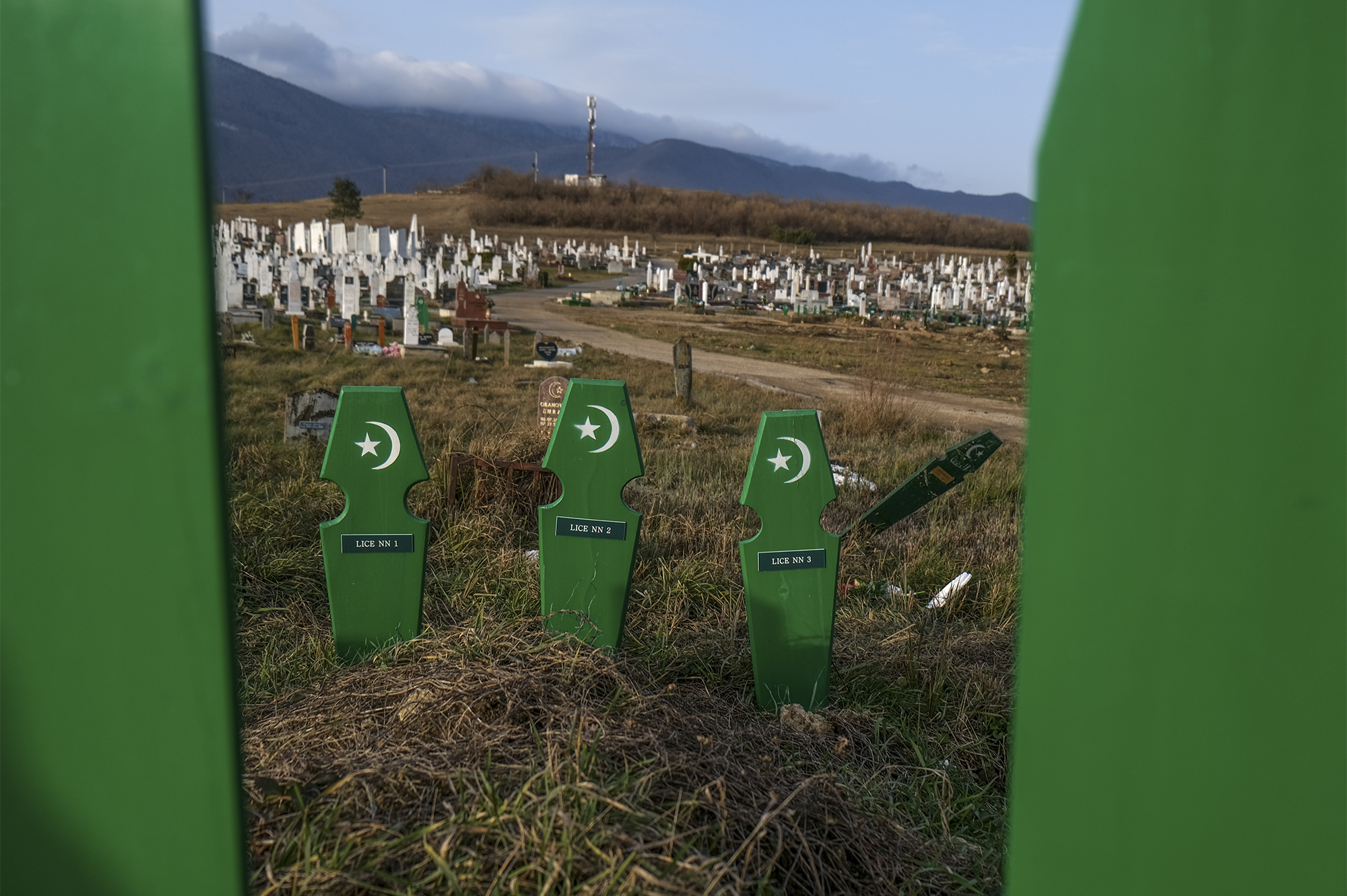
Simple graves, marked “N.N.” to denote an unnamed person, are scattered around Bosnia and Herzegovina. Photo: Kemal Softić.
Days of search
Brahim is from Morocco and currently living in Paris. For months, he has been trying to make contact with his brother Ismail, whom he last heard from in Sarajevo. The first time K2.0 spoke to Brahim, he said it had been exactly 66 days since he had last heard his brother’s voice:
“He was in Sarajevo and told me that somebody assaulted him, and after that he stopped checking in. … Since then we haven’t known where he is or if he’s alright. … The whole family is desperate.”
Ismail was travelling with some acquaintances and Brahim says that his brother’s friends claim that he is somewhere in a closed camp in Sarajevo. However, despite Brahim’s efforts, he hasn’t managed to find Ismail. The family has reported the disappearance to the Bosnian Embassy in Paris, but Brahim says they did the same thing as the Bosnian police:
“They aren’t telling us anything: We have no information,” he says. Now it’s been 69 days that we haven’t spoken.”
For Ismail’s family, every day is tough and long.
Lending a hand
The search for migrants and refugees missing in Bosnia and Herzegovina is a story of the efforts of volunteers, activists and sporadic local support. It is they who check the streets and the camps, and call the police, hospitals and morgues in an attempt to find information for families located far from Bosnia.
Dženeta Delić-Sadiković lives in Tuzla. In September, she was contacted by Waris Ali, who was asking for her help in the search for three young men from Pakistan who went missing in mid-June while crossing from Serbia to Bosnia. Waris Ali is the grandfather of one of them and his search started in Tuzla.
There had been a group crossing the river. As some of the group told Ali, they had seen how the young men disappeared beneath the water. Dženeta first contacted the hospital in Zvornik, but the bodies weren’t there. She received information that two unidentified bodies had been buried on June 28 in the Janja cemetery.
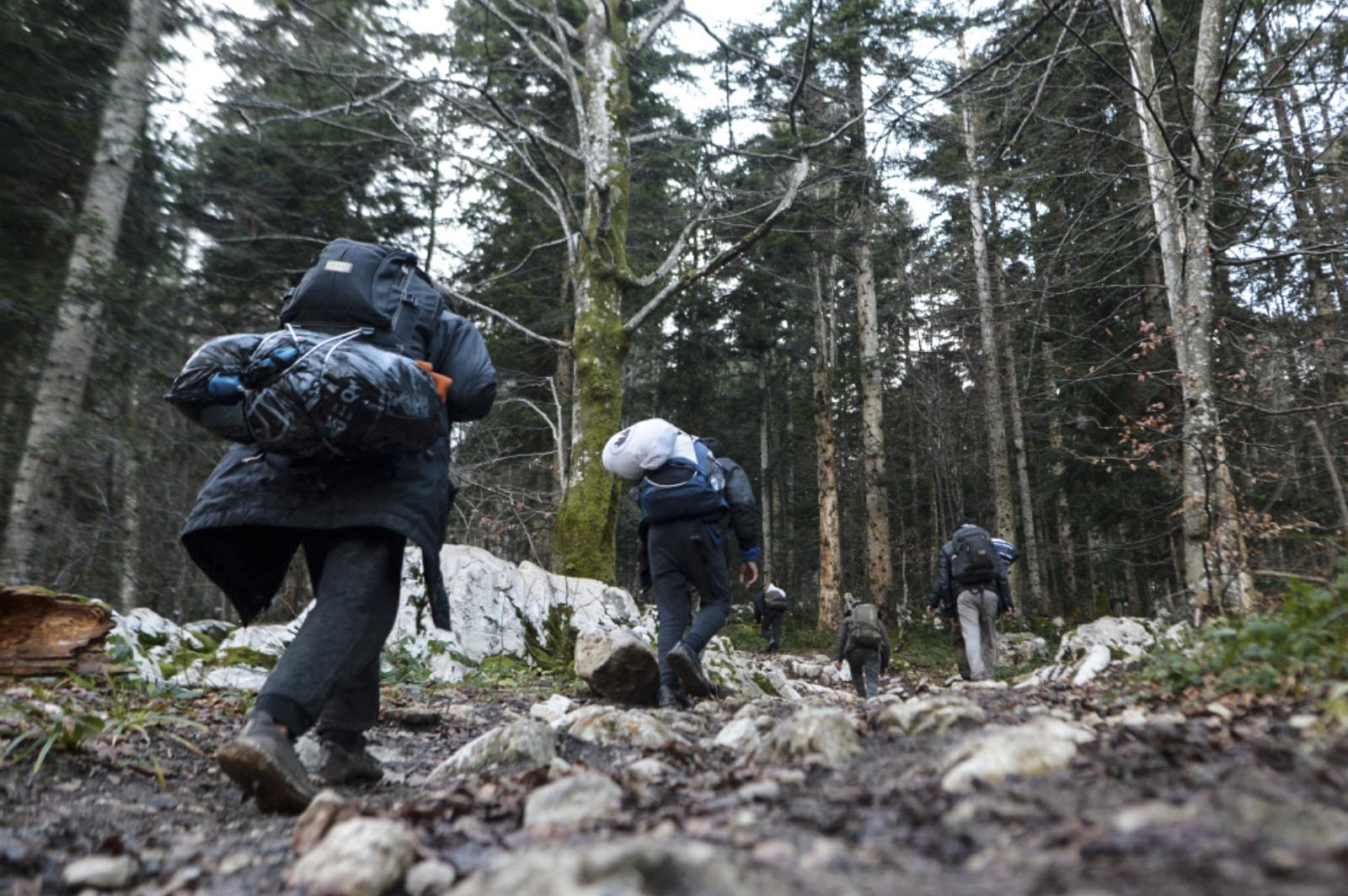
Most of those on the move in Bosnia and Herzegovina do not intend to stay in the country. Photo: Kemal Softić.
Ali went to Zvornik but the police there referred him to the Pakistani Embassy in Sarajevo. His search is still ongoing.
“In Belgrade, I spoke to the Red Cross, who then referred me to Bosnia. I went to Bijeljina, Janja and Zvornik. … They weren’t very receptive of me. Everybody avoids me: They think I’m a migrant although I have all the necessary documents to be able to come here,” he told the Oslobođenje daily.
Dženeta is already familiar with this type of experience. With help from other Tuzla-based volunteers, she has tried many times to locate the missing and find out some information about them.
If the search ends in the worst possible way — if they are found dead — money is usually collected in order to facilitate the transport of those who died, whose bodies have sometimes been lying in morgues for months. Sometimes, after intense pressure, they manage to convince IOM to cover the expenses of repatriation of the remains.
IOM is the agency that since 2018 has been awarded millions of euros by the EU — and with it effectively free rein — to take care of people on the move in Bosnia. The arrangement has been seen as undermining trust in local authorities. Among other things, IOM manages the camps (or “temporary accommodation centers,” as they call them) where people on the move are sheltered.
“IOM works to help ensure the orderly and humane management of migration, to promote international cooperation on migration issues, to assist in the search for practical solutions to migration problems, and to provide humanitarian assistance to migrants in need,” IOM details its task on the organization’s website.
Bilal’s story
Nevertheless, Delić-Sadiković says that when Tuzla-based volunteers asked for IOM’s help in transporting a young man’s body to his home country, they were told that “IOM is in charge of migrants only within the camp.” However, after she published the story on social media, and launched an initiative to collect money for the repatriation, IOM got involved with covering the costs.
In the meantime, the young man’s body was lying, along with two others, in Tuzla’s morgue for three months.
He was Bilal, a young Moroccan man to whom Dženeta had been particularly attached. She had met him at Tuzla’s bus station, where people on the move gather and often sleep since they have no other options — even three years after a large number of people started flowing into this part of Bosnia, local authorities are still refusing to give permission for accommodation to be built. The bus station has therefore turned into a place where charities’ volunteers as well as individuals working on their own initiative bring food and clothes.
“I said then that I would never again get attached to somebody — of course, I lied.”
Dženeta Delić-Sadiković, volunteer
Bilal was squatting in an abandoned house not far from Dženeta’s apartment. He was due to be setting off to try to cross the border one more time. But someone squatting in the same house left a candle burning and a fire started. Bilal woke up but was already being suffocated by lethal smoke. He died at just 24 years old.
“Bilal had a special character,” Dženeta says. “He was a good man.”
After months of waiting, paperwork, hold-ups, procedures, and begging, Bilal’s body was transferred to Morocco, where he was ultimately buried. Under pressure from the volunteers, IOM finally agreed to pay 4,500 euros in transportation costs.
“I had thought about how we would call his mother and how she would react when she saw him with the burns. I had prepared clothes for him, for when he got out of hospital, and even a phone so he could call his mom as soon as he was able to…” Dženeta wrote on Facebook after Bilal died.
Bilal’s mother never received that phone call; just his dead body.
In the photo that the family sent to Dženeta, Bilal’s mother is sitting at her son’s grave a day after the funeral. “I said then that I would never again get attached to somebody … that I would only help out with what I could,” Dženeta says. “Of course, I lied.”
My dear Ali
Dženeta’s story is similar to those of other volunteers who are searching for missing persons and get attached to their families, joining them in their suffering. Via the Dead and Missing in the Balkans Facebook group, they exchange photos and try to help find those who have disappeared.
Such volunteers searched for a young man named Ali from Pakistan, whose story ended differently from Bilal’s.
Senada Kramer lives in a village close to Tuzla. Her story of connection with a migrant also begins at a bus station, where she met Ali. She was there bringing food, but he refused her offers of help. After that, Senada often went to the station, bringing food and clothes, so she and Ali eventually got closer to each other.
“They burned everything except for the sock holding my home address.”
Senada Kramer, volunteer
In May of this year, Ali decided to try to cross the border again, after which he stopped checking in. Senada tried to find him but the police and fellow volunteers had no information. She tried to contact IOM and other foreign organizations but with no luck.
Weeks later, Ali got in touch from Velika Kladuša: nearly the northernmost point of Bosnia, by the border with Croatia. He told her that he had managed to cross the border but the Croatian police had pushed him back; they had found his money, burned his clothes and sent him back naked:
“They burned everything except for the sock holding my home address,” Senada says.
“I took a car along with my brother, because back then they didn’t allow migrants to be transported to the Una-Sana Canton by bus, so I went to Velika Kladuša to get my dear Ali. I put some blankets on him, and brought him back to my place.”
The ban on migrant transportation Senada is referring to is related to the decision of the Una-Sana Canton authorities to prohibit migrants from entering, and banning their movement within the canton. Although the state should have jurisdiction over the movement of foreigners, there was no reaction from state institutions with regard to the decision by canton authorities.
Amnesty International condemned the authorities’ move, labeling it as discriminatory and saying it threatened the human rights of people on the move. They called the decision both illegal and reckless.
Before taking Ali in, Senada asked for advice from the local hoxha (imam), the community and the municipality. She lives in a small, traditional community and she says that some of her relatives are still angry with her for what she did.
Still, she doesn’t care about it too much. Her religion is humanity: “What am I doing in a mosque, while a hungry child is lying next to the mosque?” she asks.
Ali spent another two months with Senada, and then moved on. He achieved what he set out to do and is now in Italy, with his brother.
The salvation in the mosque
Effendi Sadet Bilalić is the main imam of the Majlis of the Islamic Community of Gacko and Bileća, with a head office in Gacko.
He says that the Islamic Community of Bosnia and Herzegovina is providing as much help as it can through the Merhamet Council. The mosques’ utility rooms have sometimes provided the only shelter for migrants. He has also helped families with repatriation of remains.
In October last year, a shepherd from Bileća opened fire on a dozen displaced people in a neighboring house. A large group managed to run away but one body remained lying on the floor. The body was buried in a Bileća cemetery where Effendi Sadet Bilalić led the funeral ceremony. The young man was buried as an N.N. since he had no documents with him and it was impossible to identify him.
“During the incident, there were other people with him, so we tried to find out who he was with their help,” Bilalić says.
“We got in touch with the Moroccan ambassador in Zagreb; it was established that the person who died was Said Addouu. He was 20 years old.”
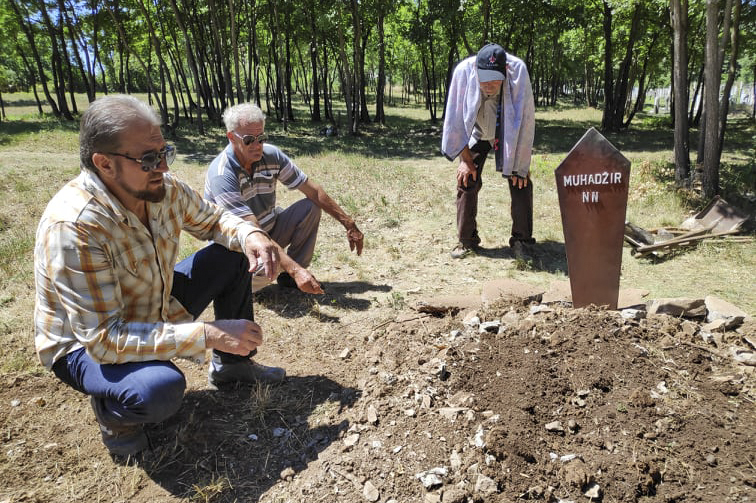
Local people and volunteers have shown support and compassion for people on the move through Bosnia and Herzegovina, but there is little sign of an organized response from state authorities. Photo courtesy of Sadet Bilalić.
After the body had been identified, Said’s parents called from Morocco.
“We spoke with the family, explaining where and how he was buried,” Bilalić says. “We had a photo where only part of his face was visible, since he was hit in the head. After realizing that the funeral was done, and he was in the cemetery, they accepted that he should stay buried here.”
The Gacko and Bileća Muslim community is small but Bilalić says they are helping as much as they can. One of the Islamic Community’s press releases says that the Community has on several occasions distributed money, food and medicine, and will continue to contribute as much as it can, in order to reduce the suffering of refugees, migrants and victims of human trafficking who are currently located in Bosnia and Herzegovina.
“But this kind of assistance … cannot replace a systemic response from state authorities and international organizations,” it says.
State authorities ignoring the issue
And what is the response of the Bosnian state authorities to the issue of missing migrants? It’s simple: Institutions either ignore the issue or claim that the responsibility lies with a different institution.
According to Bosnia’s Law on Aliens and other relevant legislation, legal responsibility for most issues relating to migrants and refugees — including monitoring, and the control of movement and stay of foreigners — sits with Bosnia’s Service for Foreigners’ Affairs. This is an operationally independent part of the Ministry of Security with its own management and acting within its own area of jurisdiction.
However when contacted by K2.0 and asked for relevant data and information about the movement of migrants, the Service denied that it was their responsibility.
K2.0 subsequently inquired at the Ministry of Security about the data on migrants and asked them about their competencies in the case of missing people, as well as the support they have provided to other state institutions. After two weeks, the Ministry responded with:
“The Ministry of Security of Bosnia and Herzegovina does not have the requested information, so we suggest that you contact the Service for Foreigners’ Affairs.”
The Service for Foreigners’ Affairs had already claimed it is “not in charge of registering and searching for missing persons” and directed K2.0 to Bosnia’s “law enforcement agencies.” When asked specifically which agencies the Service was referring to, no response was forthcoming.
Bosnia’s various ministries of interior also say that this issue is not within their competence.
“It’s very difficult to connect the identity — the person — to the name.”
Ale Šiljdedić, Una-Sana Canton Ministry of Interior
The Ministry of Interior of the Tuzla Canton, where a large number of people on the move are concentrated, only has information detailing four deaths in the last three years. They referred K2.0 back to the Bosnian Ministry of Security and the Service for Foreigners’ Affairs for more detailed information.
The Ministry of Interior of the Una-Sana Canton also confirmed that it is the competence of these state institutions to handle the issue.
Spokesperson for Una-Sana’s Ministry of the Interior, Ale Šiljdedić, provided K2.0 with the cantonal-level information it possesses, and explained why it is difficult to establish the current location of those whose disappearance has been reported, as well as the identities of those who’ve died.
“For example, the family looks for somebody using their real name and surname, while he registered under a different name,” he said. “If he then used a third name in another country, we ultimately don’t know which name to use in order to find him. Later on, it’s very difficult to connect the identity — the person — to the name.”
According to their data, 34 migrants and refugees have died in the Una-Sana Canton since 2018: Four murders, nine drownings, 12 cases of natural death, four deaths resulting from car crashes, two people falling from high places, and three persons burned in fires. Šiljdedić says that the number is most likely higher, because it doesn’t include hospital reports.
According to Šiljdedić, the state-level Ministry of Interior and Service for Foreigners’ Affairs should have the aggregate data for all of Bosnia and Herzegovina.
Connecting people
Beside the help of volunteers, people on the move in Bosnia and their families receive support from the Red Cross of the Federation of Bosnia and Herzegovina. As part of its mandate, the Red Cross offers a Tracing Service.
In the Federation — one of Bosnia and Herzegovina’s two entities — there are currently three Red Cross RFT (Restoring Family Ties) teams, in Sarajevo, Bihać and Tuzla. In the last three months, the teams have recorded around 1,250 services provided, mainly focused on restoring or maintaining family ties and contacts between migrant family members and people on the move.
“Members of our mobile teams are enabling people on the move to have phone calls with family members, or charge their phone batteries, providing them access to internet cards and top-up vouchers,” says Indira Kriještorac, spokesperson of the Bosnian Red Cross.
Additionally, people have access to the “Trace the Face” web page in case of separation on the road. Photos of missing persons are published on this page and if someone looking for a loved one recognizes the missing person from the photo, they can contact the closest Red Cross office in order to get in touch.
The most frequent issue members of RFT teams face in the Federation is the fact that Bosnia is a transit country. People on the move do not therefore stay for long in this country, so by the time a request reaches the Red Cross, they have mostly lost track of the missing person.
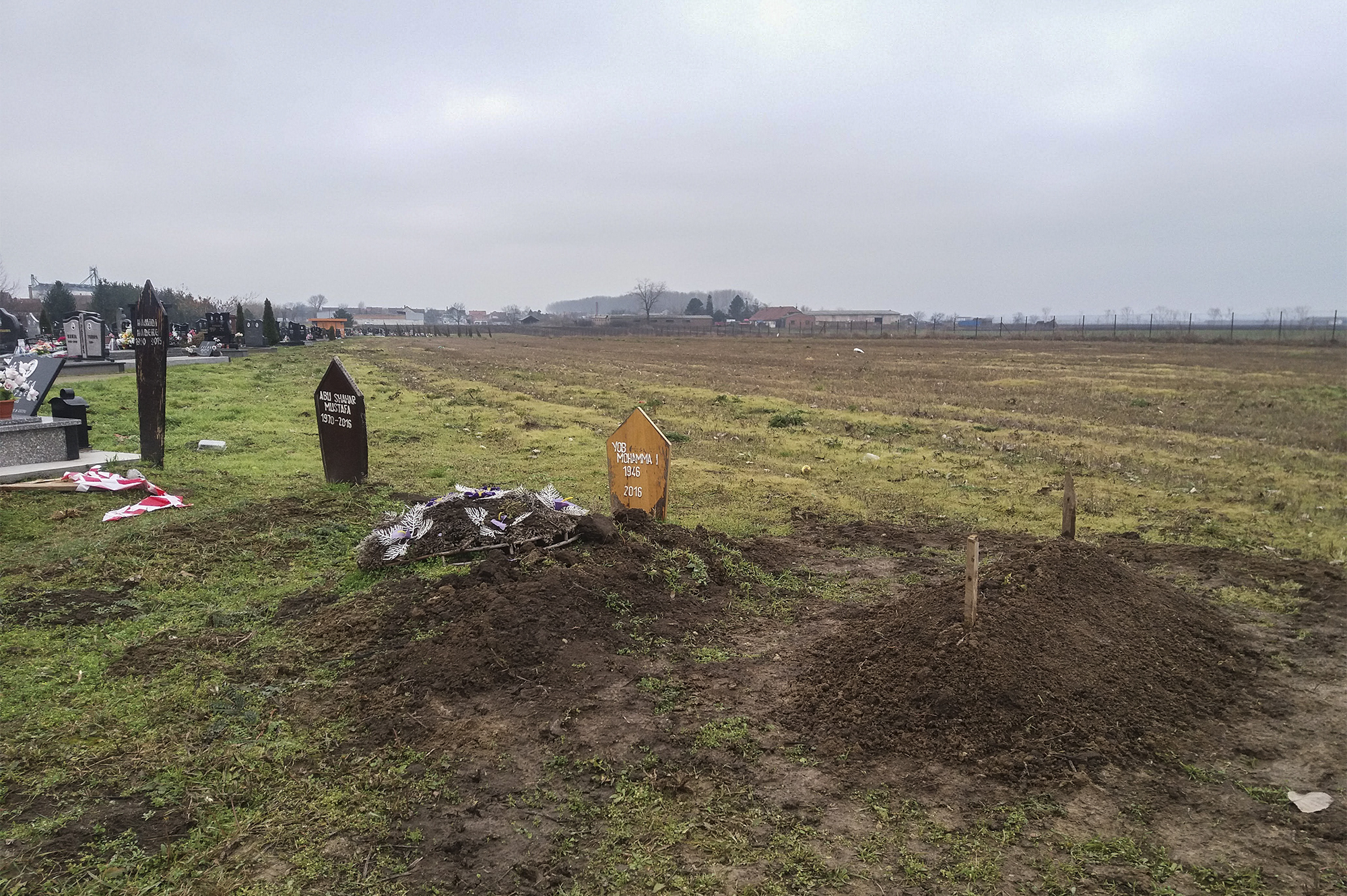
Often, little is known about those who die while on the move, although some local organizations and individuals are attempting to shed light on their stories. Photo: Nidžara Ahmetašević.
Meanwhile, the stories surrounding missing and perished displaced people also spread through social media and webpages.
The Transbalkan Solidarity portal, a collective of people active in supporting people on the move in various ways, have established a memorial page in honor of victims of the European border regime in the Balkans. It contains photos of those who have died attempting to reach the EU, and also has a simple statement:
“We stand strong and we stand together in honor of all the victims of border violence and police brutality in the Balkans, in honor of all the deceased, women, men and children, who died while residing, settling in or migrating to Europe by land or sea. We stand strong and we stand together with their families, sisters and brothers, friends and communities around the world. We stand strong and we stand together to demand justice for every life lost and taken, for every drowning, for every detention and camp confinement, every bullet fired, every pushback, torture, beating and starvation that led to a human dying!”
Elusive Europe
In July of this year, a body was found on the shores of the Bileća Lake. Effendi Sadet Bilalić says that the body was in a state of decay with a completely unrecognizable face.
“The autopsy performed by the Institute for Forensic Pathology in Trebinje demonstrated that the deceased [had a heart condition] and was diabetic, and that he had died of a heart attack. He remains unidentified,” Effendi Bilalić says. “They don’t know where he was from… Pakistan, Bangladesh, Afghanistan… he was buried as an unidentified person and there are no photos of his face because it is unrecognizable.”
One more N.N. gravemarker has been prepared.K
Feature image: Kemal Softić / K2.0.
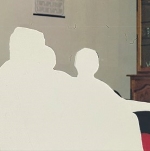
Back to Monograph






